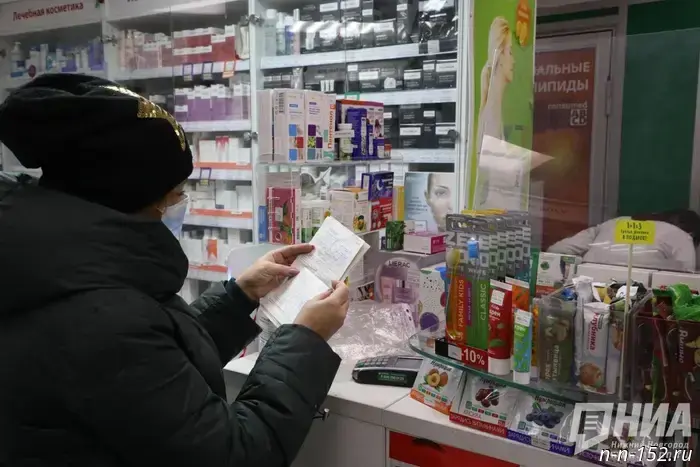
Nizhny Novgorod residents were warned about the danger of overusing antibiotics.
17 November 2025 12:00 Society
Antibiotics have radically changed medicine over the past eight decades. After the discovery of penicillin, which was awarded the Nobel Prize in 1945, humanity gained the ability to treat infections that were previously considered fatal. Today there are dozens of groups of antibacterial drugs, as well as agents with antifungal and antitumor activity. However, the wide availability of these medicines has led to a new global problem — the rise of antimicrobial resistance. Clinical pharmacologist Anna Dolmatova explained why this is happening and what can be done to influence the situation.
Antimicrobial resistance is the ability of bacteria, viruses, fungi and parasites to lose sensitivity to drugs intended to fight them. According to Anna Dolmatova, the problem affects everyone: resistant microorganisms deprive medicine of effective tools, which means that familiar infections become dangerous again.
If resistance used to develop to a single antibiotic and doctors could find a combination of drugs, today there are bacteria that are insensitive to several classes of drugs at once. That is what makes the situation critical.
According to researchers' estimates, by 2025 drug-resistant bacterial infections had already caused 1.3 million deaths.
Mutations, exchange of genetic information between bacteria and other mechanisms allow microbes to adapt. Without containment measures, humanity could return to an era when even a small wound or a common infection posed a threat to life.
Dolmatova explains: bacteria can be resistant to antibiotics from the outset or acquire this ability during the course of events.
There is also innate resistance. It arises when a microorganism lacks the target that an antibiotic should act on, or when the target is inaccessible. Such characteristics are listed in the instructions: the drug simply cannot act on a particular type of microbe.
There is also acquired resistance. It forms when microorganisms come into contact with antibiotics, through mutations in chromosomal DNA, the emergence of mosaic genes, and horizontal gene transfer between bacteria.
Acquired resistance manifests in several strategies:
• blocking the drug's entry into the cell;
• destroying the active substance with enzymes;
• actively "pumping" the drug out of the cell using special protein pumps;
• bypassing the antibiotic's mechanism of action — for example, altering the sites that the drug is supposed to recognize.
These mechanisms allow microbes to survive and adapt even under the influence of powerful antibacterial agents.
One of the key causes, Anna Dolmatova names, is self-medication. Antibiotics are often taken without indications, for example for a common cold or viral infections, against which they do not work.
Common mistakes:
• incorrect dosage;
• failure to adhere to dosing frequency;
• course too short;
• stopping treatment as soon as symptoms improve.
As a result, the concentration of the drug in the body does not reach the level necessary to destroy all the bacteria. The surviving microbes become resistant, and the antibiotic may not work the next time.
Agriculture also makes a serious contribution to the problem. More than half of all antibiotics in the world are used in livestock — for disease prevention, growth promotion and reducing animal mortality. This contributes to the emergence of resistant strains that can then enter food products.
Since 2018, a Reference Center for monitoring antibiotic residues and antibiotic resistance of bacteria in food raw materials and food products has been operating within Rospotrebnadzor. Its task is to control the content of antibiotics and resistant microorganisms, as well as to forecast epidemiological risks.
It is impossible to completely stop the process of resistance formation, but it can be significantly slowed down. Anna Dolmatova highlights the main preventive measures:
• refrain from self-medication and take antibiotics only as prescribed by a physician;
• strictly follow the treatment regimen — dosage, dosing frequency, and duration of the course;
• get vaccinated to reduce the risk of infections that require antibacterial therapy;
• maintain hygiene and treat wounds and scratches;
• take responsibility for your health.
The expert emphasizes: antibiotics are not a remedy for acute respiratory viral infections, as viruses are not susceptible to them. Irrational use of drugs leads to a situation in which, in a real bacterial infection, the needed antibiotic simply may not work.
NIA "Nizhny Novgorod" has a Telegram channel. Subscribe to stay informed about major events, exclusive materials and timely information.
Copyright © 1999—2025 NIA "Nizhny Novgorod". When reprinting, a hyperlink to NIA "Nizhny Novgorod" is mandatory. This resource may contain 18+ materials.
Другие Новости Нижнего (Н-Н-152)
 Entrepreneurs in Nizhny Novgorod will be able to receive advice on placing non-stationary retail outlets via a hotline on November 18.
Entrepreneurs in Nizhny Novgorod will be able to receive advice on placing non-stationary retail outlets via a hotline on November 18.
Entrepreneurs in Nizhny Novgorod will be able to receive advice on placing non-stationary retail outlets via a hotline on November 18.
Entrepreneurs in Nizhny Novgorod will be able to receive advice on placing non-stationary retail outlets via a hotline on November 18.
 Beeline became the leader in 4G quality on the M-12 "Moscow–Kazan" highway.
Beeline became the leader in 4G quality on the M-12 "Moscow–Kazan" highway.
 Vyksa's "Quantorium" has enrolled students for its first academic year.
1,200 young people from Vyksa and neighboring districts submitted applications for training at "Kvant OMK", which was built by the United Metallurgical Company (OMK). November 17, 2025. NewsNN.Ru. Nizhny Novgorod Region. Nizhny Novgorod.
Vyksa's "Quantorium" has enrolled students for its first academic year.
1,200 young people from Vyksa and neighboring districts submitted applications for training at "Kvant OMK", which was built by the United Metallurgical Company (OMK). November 17, 2025. NewsNN.Ru. Nizhny Novgorod Region. Nizhny Novgorod.
 A lecturer from the Znanie Society held a meeting with students in Kstovo.
An educational lecture by the Russian society "Znanie" was held at the Kstovo Petroleum Technical College named after Boris Ivanovich Kornilov. November 17, 2025. Nizhegorodskaya Pravda. Nizhny Novgorod Region. Nizhny Novgorod.
A lecturer from the Znanie Society held a meeting with students in Kstovo.
An educational lecture by the Russian society "Znanie" was held at the Kstovo Petroleum Technical College named after Boris Ivanovich Kornilov. November 17, 2025. Nizhegorodskaya Pravda. Nizhny Novgorod Region. Nizhny Novgorod.
 A pensioner from Nizhny Novgorod twice gave scammers about 1.8 million rubles in Moscow.
A pensioner from Nizhny Novgorod twice gave scammers about 1.8 million rubles in Moscow.
 Savings from tenders in the Nizhny Novgorod Region exceeded 100 million rubles in October.
The bulk of the savings came from road maintenance and repairs to social facilities.
Savings on tenders in the Nizhny Novgorod Region exceeded 100 million rubles in October. November 17, 2025. Komsomolskaya Pravda. Nizhny Novgorod Region. Nizhny Novgorod.
Savings from tenders in the Nizhny Novgorod Region exceeded 100 million rubles in October.
The bulk of the savings came from road maintenance and repairs to social facilities.
Savings on tenders in the Nizhny Novgorod Region exceeded 100 million rubles in October. November 17, 2025. Komsomolskaya Pravda. Nizhny Novgorod Region. Nizhny Novgorod.
